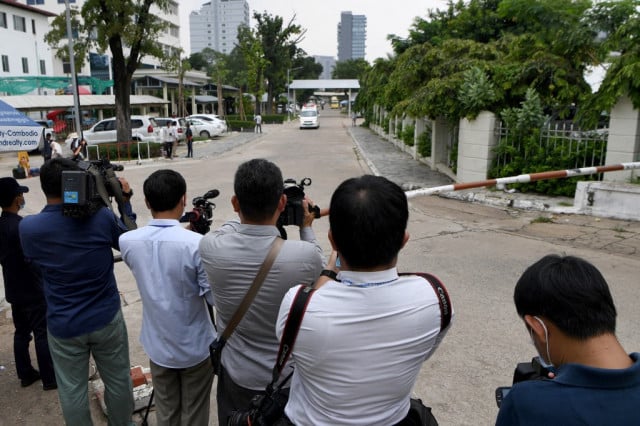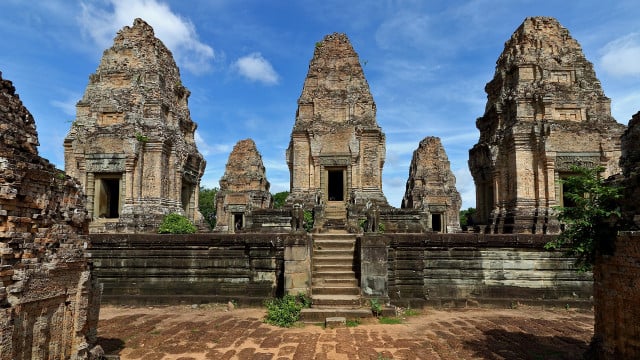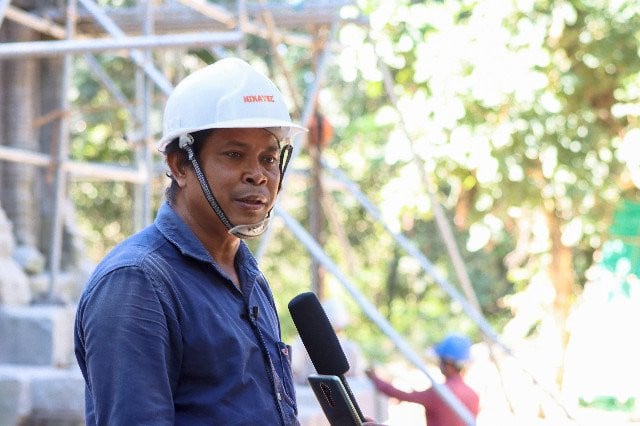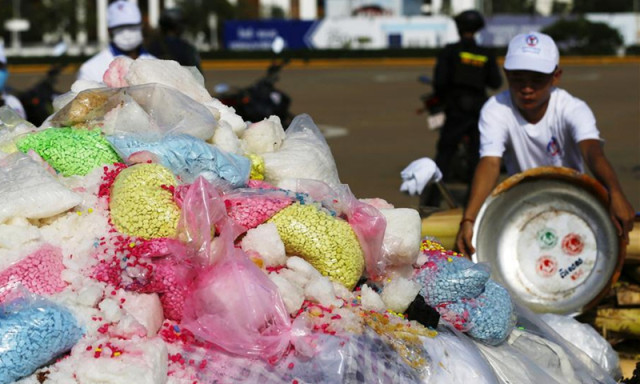Report: Crimes Against Journalists Not Investigated, Law Used to Silence Critics

- Phoung Vantha and Gerald Flynn
- March 31, 2021 3:14 AM
The government has sought to play down findings published by the Cambodian Journalists Alliance Association that suggests violence, legal harassment and intimidation are suppressing critical reporting.
PHNOM PENH--A new report from the Cambodian Journalists Alliance Association (CamboJA) has detailed 35 cases in which 72 journalists were harassed over the course of 2020.
Released on March 29, the 28-page report stated that 31 journalists were imprisoned in Cambodia last year, while 22 faced violence, 11 were detained for questioning and eight more were the targets of legal action.
“The reported harassment cases against journalists in 2020 were widespread, with incidents recorded in 15 different provinces throughout the country,” the report stated, adding that Phnom Penh, along with Ratanakiri and Kratie provinces were the sites of 58 percent of the harassment documented.
CamboJA’s report detailed how forced confessions, accusations of “fake news” and the impunity of those who seek to undermine the role of journalists all played into “the sense of fear and futility for those seeking to expose bad actors inside and outside of government.”
“The Criminal Code remains a powerful legal tool, which is too often used to intimidate and jail journalists,” the report added, noting that as of December 2020, at least 10 journalists remain in prison, eight of which are in pre-trial detention for criminal charges.
The report examined six case studies where journalists had been met with varying forms of harassment while performing their duties of informing the public and while the report listed the sheer volume of media outlets, operating through a variety of mediums, available in Cambodia, it omitted that few are free from government or government-friendly commercial interest.
The anniversary of the Paris Peace Agreement on Oct. 23, 2020—a day that saw violence from police directed towards protesters and observers alike—was the first case study in CamboJA’s report.
Prime Minister Hun Sen had warned against people demonstrating on the 29th anniversary, claiming protesters did not understand his role in the 1991 signing of the agreement and that arrests were imminent.
However, protesters—who were beaten, pushed to the ground and met with a large police presence last October—suggested Hun Sen was more concerned with amassing a personal fortune than dealing with the problems that Cambodians faced.
Six journalists were harassed over the course of the Oct. 23 protests, with reporters from VOD ordered to stop filming and taking photographs, a Reuters cameraman was also prevented from filming, while even pro-government media outlet Khmer Times saw one of their reporters forced to hand over a camera. A reporter for Thmey Thmey, along with a freelance photographer, were physically accosted while photographing the police drag a female protester across the pavement outside the US Embassy.
Attacks on Journalists Go Uninvestigated
Another case study highlighted the lack of investigation that follows even the most serious of violence against journalists. Kouy Piseth, a reporter for CBN TV, was found dead with a wound in the back of his head. Authorities declared the death the result of a motorbike accident, but no investigation was ever conducted.
Again, the impunity enjoyed by those who commit crimes against journalists—particularly journalists reporting on issues that highlight corruption in the spaces where government and private interests intersect—was detailed in CamboJA’s report by an incident in Tbong Khmum Province.
Four journalists were attacked by between five and seven people who were armed with axes and knives. The journalists had been sleeping in their cars at the time of the attack, but were en route back to Phnom Penh following an investigation into illegal logging in Kratie Province when the attack took place.
By all accounts CamboJA News conducted a more thorough investigation than police, who victims of the attack said have failed to look into the attack. The police conceded that they had little to show for any investigative efforts made.
This may be in part due to the longstanding link between government officials—both high and low-ranking—and illegal logging operations that has been well-documented, with little changing over decades despite the millions of dollars invested by international donors.
Journalists Target of Legal Action for Critical Reporting
Decrying CamboJA’s evidence as “incomplete” and “unscientific” in methodology, Chin Malin—a spokesperson for the Ministry of Justice—said that a sufficient legal analysis had not been conducted, particularly regarding the events that had led to crimes against journalists.
“Journalists do not have the same immunity as members of parliament, that is, if they make a professional mistake, they will be held accountable under the Press Law, but if they commit a criminal offense, they will be held accountable under criminal law, which is in force like any other citizen,” Malin said.
“If perpetrators of criminal offenses are not responsible according to the law, where is the legal responsibility? If the perpetrator commits a criminal offense and is not responsible under the criminal law, what is the purpose of criminal law?” he said.
However, Malin—who would not respond to queries as to whether he had read CamboJA’s report or not—has frequently omitted the politicized nature of Cambodia’s judiciary and his apparent determination to convict critical journalists is not mirrored in his desire to conduct investigations into those who attack, harass, or intimidate law-abiding reporters.
“Yes, I do agree that journalists are not above the law,” said Nop Vy, executive director of CamboJA. “If they committed a crime then they should be sentenced by the criminal code, but if they are producing stories or they release their opinions, then it is not related to crime. Journalism is not a crime.”
He said that journalists “are like messengers” bringing information from people to policymakers and vice versa and that certain reporters appear to have been targeted not for criminal behavior, but rather for having relayed information that government didn’t approve of.
This was highlighted in CamboJA’s report in the cases of Sok Oudom, who was convicted of “inciting a felony” and sentenced to 20 months in prison for reporting on sensitive land disputes in Kampong Chhnang Province—where land disputes date back to Hun Sen’s granting of economic land concessions in the 2000s and 2010s. Most remain unresolved, with rights advocates warning that the relocation efforts made by the government have been “inadequate.”
“We have also observed that the Press Law has not been used by courts in cases against journalists, [instead] the criminal code is used generally,” said Vy. “This is opposed to international law and our constitutional laws related to press freedoms, journalists’ freedoms and rights.”
Harassment of Journalists Undermines Democracy
A case noted in CamboJA’s report that made international headlines last year was that of Sovann Rithy, an online TV journalist who was arrested in April 2020 after he repeated advice Hun Sen gave to impoverished motorbike taxi drivers.
Despite quoting Hun Sen word-for-word, Rithy was arrested, convicted and spent six months in jail—earning an International Freedom of Speech Award in the process—before being released on a suspended sentence in October 2020.
Ros Sokhet, publisher of Cheat Khmer—an online news outlet—also met a similar fate, barring the international accolade. Sokhet, 54, was arrested in June 2020 after he posted remarks criticizing Hun Sen for preparing his eldest son, Hun Manet, to take over as the next Cambodian prime minister.
In response to Sokhet’s arrest, the International Federation of Journalism lambasted the Cambodian government, saying that “The arrest and sentencing of Ros Sokhet is the latest attack on press freedom and journalistic expression in Cambodia, with authorities immediately silencing political criticism and dissidence without compassion.”
CamboJA said that the ongoing imprisonment, detention and physical threats against journalists undermines the media’s role in a democratic society and strikes fear in those who cover stories or cases involving powerful officials.
Nop Vy said that the report shows that journalists who dare to cover and report on the interests of military and powerful officials are still being persecuted through the judiciary system, as well as being beaten, intimidated and harassed.
“We call on the Royal Government to ensure the safety and security of all journalists so that they can exercise their rights to freely report without fear,” he said.















